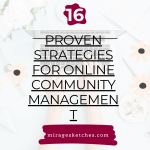Introduction
In the fast-paced digital landscape, community management has emerged as a pivotal aspect of fostering meaningful connections and nurturing engaged online communities.
From the early days of online forums to the advent of social media, the role of community managers has continuously evolved, adapting to the changing needs of the internet era.
But what lies on the horizon for this crucial field? What is the next big thing that will shape the future of community management?
In this article, we delve into the fascinating world of community management and explore the transformative trends that are set to redefine how communities are managed and thrive.
The Rise of AI-Powered Community Management
One of the most compelling developments in community management is integrating artificial intelligence (AI) into the process.
AI-driven community management tools leverage data analytics, natural language processing, and machine learning algorithms to enhance engagement, moderation, and content curation.
These smart tools can efficiently monitor and identify trends, sentiment, and potential issues within a community, enabling community managers to respond swiftly and effectively.
By automating routine tasks, AI allows managers to focus on building authentic connections and devising strategies that resonate with the community’s unique needs.
Personalization
As communities grow larger and more diverse, the importance of personalization cannot be overstated.
The next big thing in community management lies in offering tailored experiences to community members.
Community managers can deliver relevant content, targeted recommendations, and personalized interactions through AI-powered algorithms and user data analysis.
When members feel understood and valued, their engagement and loyalty to the community increase significantly.
The Age of Multi-Platform Communities
In the past, online communities were primarily confined to specific platforms like forums or social media networks.
However, the future of community management lies in integrating multi-platform strategies.
Modern communities thrive on various channels simultaneously, from social media groups and dedicated forums to chat apps and video streaming platforms.
Community managers must adapt and synchronize their efforts across these platforms, fostering a cohesive and consistent community experience.
The Power of Gamification in Community Building
Human beings are naturally drawn to challenges, achievements, and recognition.
Harnessing this intrinsic motivation, community managers increasingly turn to gamification as a powerful community-building tool.
By implementing gamified elements like badges, leaderboards, and rewards, managers can encourage participation, increase member contributions, and foster a sense of healthy competition within the community.
Gamification not only adds an element of fun but also boosts retention and commitment to the community’s shared goals.
Authenticity
Trust has become a precious commodity in an era of information overload and fake news.
The next big thing in community management revolves around authenticity and transparency.
Community managers must establish open communication channels, address concerns honestly, and prioritize integrity.
Community managers can build trust with their members to create a safe space for genuine interactions, constructive feedback, and productive discussions.
Nurturing Micro-Influencers to Drive Community Growth
Influencer marketing has transformed how brands connect with their audiences, but a new trend is emerging—micro-influencers within communities.
These individuals possess a smaller but highly engaged and dedicated following within the community.
Community managers recognize these micro-influencers value and collaborate with them to amplify their reach, advocate for the community, and drive growth.
This strategy benefits the community and empowers the micro-influencers to be vocal advocates for the causes and ideas they hold dear.
The Future is Audio and Video Content
As internet speeds and bandwidth improve, multimedia content is taking center stage.
Video and audio formats are becoming the preferred mediums for community engagement.
From live-streamed events and interactive webinars to podcast discussions, community managers embrace audio and video content to deliver compelling experiences and forge deeper connections.
These dynamic formats foster real-time interactions, stimulate discussions and bring the community together in more immersive ways.
Embracing Change and Embodying Resilience
In conclusion, the next big thing in community management revolves around embracing change, harnessing technology, and embodying resilience.
By staying adaptable and receptive to emerging trends, community managers can successfully navigate the ever-evolving digital landscape and lead their communities toward a vibrant and prosperous future.
The Impact of Decentralization
As we look to the future of community management, we can’t ignore the growing influence of decentralization.
Decentralized platforms and blockchain technology have disrupted traditional models, leading to decentralized autonomous organizations (DAOs) and community-driven decision-making processes.
These novel approaches put the power back into the hands of community members, enabling them to have a direct say in the community’s direction, rules, and resource allocation.
In a decentralized community, decisions are made through transparent voting mechanisms, and smart contracts ensure that the agreed-upon rules are enforced automatically.
This shift towards decentralization fosters a sense of ownership and empowerment among community members as they become active participants in shaping the community’s destiny.
However, with great power comes great responsibility.
Community managers in decentralized settings must adapt to their evolving roles.
They no longer hold absolute authority but serve as facilitators, coordinators, and mediators, guiding the community toward collective goals.
Their success depends on their ability to navigate the complexities of decentralized governance and build consensus among diverse stakeholders.
Privacy and Data Protection
Data privacy and protection have become paramount concerns as communities flourish online.
The next big thing in community management involves prioritizing the security and privacy of community members’ data.
Community managers must implement robust data protection measures and ensure compliance with evolving regulations.
Respecting members’ privacy builds trust and confidence within the community, encouraging open engagement and fostering a sense of safety.
Transparent data policies and communication about how data is collected, used, and stored are essential for community managers to maintain a positive and sustainable relationship with their members.
Beyond Digital
While the digital world has revolutionized community management, the future also holds space for in-person events to come back.
Face-to-face interactions offer intimacy and connection that virtual communication can’t fully replicate.
Community managers are exploring hybrid approaches, combining online and offline events to provide diverse experiences for their members.
From conferences and meetups to workshops and retreats, these in-person gatherings reinforce the community’s sense of belonging and commitment.
They provide opportunities for members to forge deeper connections, share experiences, and collaborate on projects, enriching the community experience.
Sustainability and Social Impact
As communities grow in influence and reach, their impact on society becomes more pronounced.
The next big thing in community management involves a heightened focus on sustainability and social responsibility.
Community managers are uniquely positioned to advocate for and lead initiatives that contribute positively to the world.
Whether supporting environmental causes, promoting diversity and inclusion, or championing social justice, community managers can mobilize their members to effect meaningful change.
By aligning the community’s values with larger social causes, community managers can foster a sense of purpose and create a lasting legacy beyond the digital realm.
Conclusion
The future of community management is exciting, dynamic, and ripe with opportunities.
As we embrace these changes, community managers must remember that the human element is at the core of their role—the passion, connections, and shared experiences that bind communities together.
They are the catalysts that foster belonging, drive engagement, and facilitate meaningful connections.
With the next big thing in community management on the horizon, the journey ahead promises to be transformative and rewarding for both community managers and their vibrant communities.





